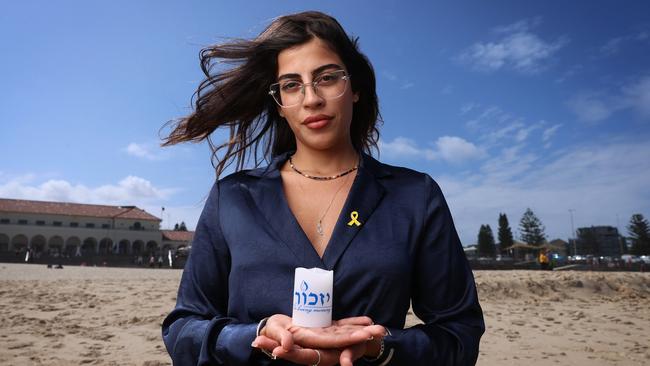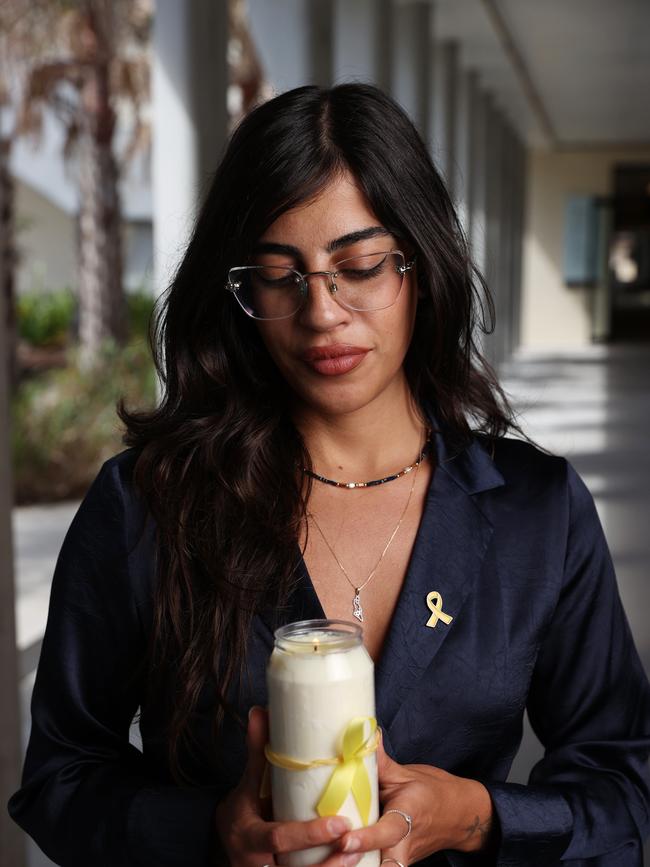A year on, the fear and the fight are still the same for October 7 survivor Michal Ohana
A year has passed since Michal Ohana hid underneath a military tank for seven hours in southern Israel as she watched and heard Hamas militants kill dozens of people in the festival grounds around her.

A year has passed since Michal Ohana hid underneath a military tank for seven hours in southern Israel as she watched and heard Hamas militants kill dozens of people in the festival grounds around her.
Michal, now 27, was shot in the leg and the stomach when terrorists spotted her and others under and behind the empty IDF tank, and slowly encircled the vehicle before shooting them without hesitation.
Ten of her friends, some of whom she was dancing with hours earlier, were killed. Two other friends – Elkana Bohbot and Eliya Cohen – were taken hostage and remain in Gaza.
Over the span of eight or so hours, 364 people who came to celebrate were killed, and more than 40 were taken hostage.
After Michal arrives in Australia on Tuesday night, she sees the news of a suspected terror attack back home in Israel, where at least seven people were killed and another nine were injured in the commercial hub of Tel Aviv.
A year on, the fear, and the fight, is still the same for her.
“So it can be … It can be in Israel yesterday and on October 7th,” she tells The Weekend Australian on Wednesday. “I hear the saying ‘never again is now, never again is now’ because when they come to kill, they didn’t ask if you’re Jewish, if you’re not Jewish, they come to kill everybody.

“So we need to show the people of the world the truth of what happened to us, and what still happens in Israel.”
Michal, an Israeli Jew, speaks softly and slowly as she relays the traumatic experience of that unthinkable day at the Nova Music Festival in Re’im in southern Israel, as she has many times now, all over the world, for many different audiences.
“Because I was there. Because I’m Jewish. Because I’m a survivor. I feel like I need to talk. And I am the voice for all these people who were murdered, who were kidnapped, for the survivors. And if I feel I have the power, I do it.”
Michal was living what she describes as the “perfect life” in Portugal at the time and returned to Israel to meet her nephew as her older sister had just given birth.
The veterinary nurse went on a whim to the 3000-person festival a few kilometres from central Gaza, hoping to reconnect and “celebrate life” with all her friends. She arrived at 1am on October 7 and, elated and carefree, danced until 6.30am. That is, until rockets started firing from Gaza and the music stopped.
Michal and a friend stayed in their car until about 8am when they started to hear gunshots. They drove away for about two minutes before cars, filled with Hamas militants, started shooting at them.
“So we get out of the car, and we start running (to the area of the festival) … I see people start to fall to the ground. And my body was in such stress and panic, so I sit on the ground and I start to cry … I took (a) video and said if I die someone would take the video and see what happened to us.”
In the distance, she spotted an Israeli tank, thinking they were being rescued. But when she approached the tank, she realised the soldiers inside had been murdered or kidnapped.
So, she hid under the tank.
“I saw a lot of people, they scream and they’re shot, and I remember I close my eyes, and I do like this in my ears,” she says as she actions putting her fingers in her ears.
“It was a fight for seven hours … I know that I’m going to die. I don’t know how and I don’t know when, but all this time, I pray. I pray to the God … I said please God, I don’t want to die. Not today, not like this, please save me.”
At one point, she says, she opened her phone and checked Telegram, and saw GoPro footage taken by Hamas which showed women being raped at the festival.
“And then when I saw this, I understand, they didn’t come only to kill. They come to rape, they come to kidnap. And this was for me, (was) the scariest time.”
She found it hard to put into words the fear she felt when the terrorists spotted them under the tank.
“They saw us, they come from all around, and just shot everybody. It was like automatic. They shot me on my leg, on my stomach, and I remember this moment, I called my mum and I said ‘Mum, I love you, but I think I’m going to die, because I’m under attack, they shot me and I’m bleeding and no body is coming’.”
Another seven hours later, the army finally arrived to take her to the hospital. She ended up in the same hospital where her sister was still recovering from a caesarean.
“After a few hours I’m understanding that I lost 10 of my friends, and two of my friends they were kidnapped, and they’re still in Gaza until today.
“The first month, I stayed alive, but I feel like my soul is dead. Like my heart is bleeding – (and) until today.
“But after one month, I understand that I’m alive and if I’m still alive, I have to do something. After one month I start to share my story and go all over the world. I feel better today, but it’s more hard for me because it’s one year and my friends (are) still there in Gaza. It’s crazy.”
A year since October 7 is difficult for Michal to put into words. “It’s hard, it’s hard. Too much time,” is all she says.
On Sunday she will honour her friends again in Sydney at one of the first global commemorations of October 7.
She doesn’t have plans for the future. Only to continue telling her story of survival: “Until they’re back (from Gaza)”.
When asked whether she had faith her friends in Gaza were still alive, she shakes her head.
“We have only the first video when they were kidnapped from the festival and that’s all.”
She smiles when she talks about her old life in Portugal, working with animals.
“I was a happy girl that loved life. And celebrated and go to parties. And I believe in people. After October 7, all my life changed … And I think I need to live with this for my whole life … But we go, we will dance again, for sure.”




To join the conversation, please log in. Don't have an account? Register
Join the conversation, you are commenting as Logout